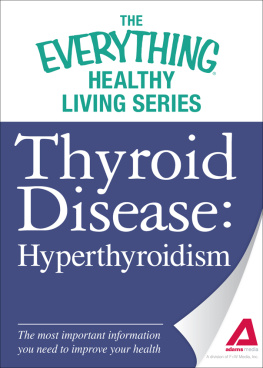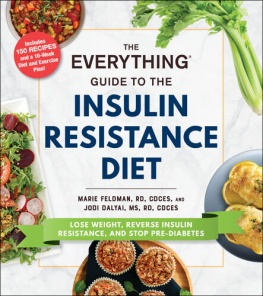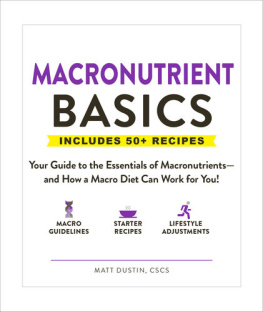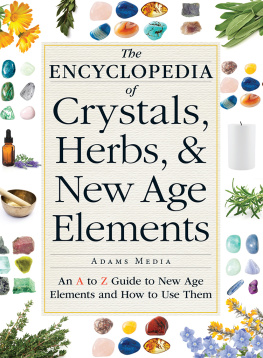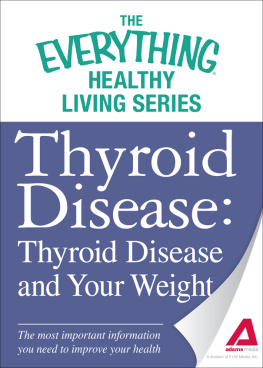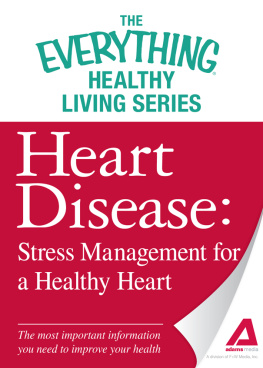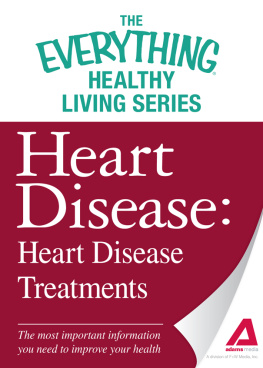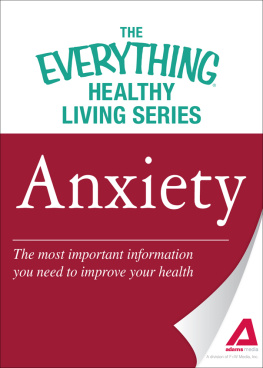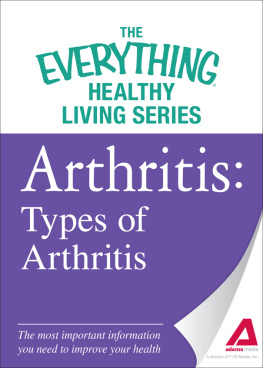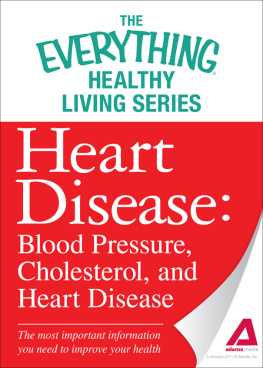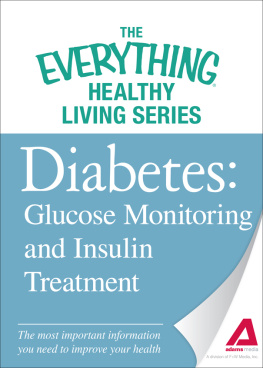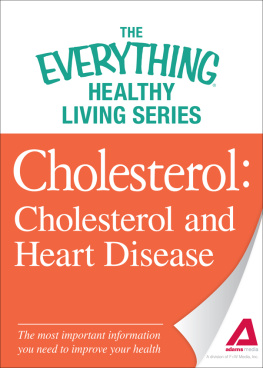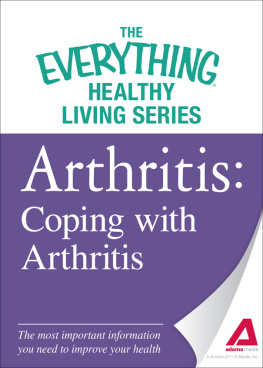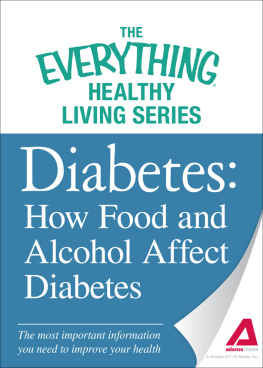Adams Media, an imprint of Simon & Schuster, Inc.
For more than 10 years, millions of readers have trusted the bestselling Everything series for expert advice and important information on health topics ranging from pregnancy and postpartum care to heart health, anxiety, and diabetes. Packed with the most recent, up-to-date data, Everything health guides help you get the right diagnosis, choose the best doctor, and find the treatment options that work for you.
The Everything Healthy Living Series books are concise guides, focusing on only the essential information you need. Whether youre looking for an overview of traditional and alternative migraine treatments, advice on starting a heart-healthy lifestyle, or suggestions for finding the right medical team, theres an Everything Healthy Living Book for you.
Thyroid Disease
According to the American Association of Clinical Endocrinologists, there are 27 million people in this country with some form of thyroid disease. Approximately half are unaware that they have this condition.
Having a healthy thyroid has numerous implications for your life, your health, and your happiness. A healthy thyroid makes it easier for you to maintain your body weight, keeps depression at bay, and gives your cells the energy they need for all the activities you do. The proper amount of thyroid hormone is also essential for menstrual regularity, pregnancy, and the delivery of a healthy baby. An unhealthy thyroid, on the other hand, can cause problems as diverse as dry hair, difficulty concentrating, and muscle aches. It can make you perpetually uneasy, constantly exhausted, and sweaty for no good reason. In short, the thyroid gland affects virtually every aspect of your health and well-being.
That said, you may wonder how anyone could have a thyroid problem and not know it. Its simple. Many people with thyroid disease are being treated only for their symptoms. So rather than being properly treated for a thyroid problem, theyre being given remedies for specific symptoms. An antidepressant for depression. A sleeping pill for insomnia. Stool softeners for constipation. For many people, treatment for the underlying thyroid disorder could correct all these symptoms.
Thats why this book is so vital. By reading this material, you will glean the basic medical knowledge you need to talk intelligently with your doctor about your thyroid condition, so that you can ask smart questions, get the right tests, and get the appropriate treatments. Best of all, you will do all this without wading through heavy medical terminology.
No, its not always easy to have a thyroid disorder. But the good news about thyroid disease is that most people are readily treated and go on to live perfectly normal, healthy lives. The key to getting well and staying well is knowledge. By picking up this book, youve made a commitment to learn as much as you can about your thyroid. And thats one giant first step toward better health.
If youd like to learn more about thyroid disease, check out The Everything Guide to Thyroid Disease, available in print (978-1-4405-2853-8) and eBook (978-1-4405-2948-1) formats.
What Is Hyperthyroidism?
Youre nervous, edgy, and your heart feels as if its always racing. At night, you cant sleep. During the day, you feel warm and sweaty. If your thyroid is the culprit, you may have hyperthyroidism, which does exactly what the name suggests: It makes you hyper. Calming the overactive thyroid requires action to slow everything down. Read on to learn more about this once deadly disease.
Hyperthyroidism occurs when you have an overactive thyroid gland. The result of this excess activity is called thyrotoxicosis, which means that you have too much thyroid hormone circulating in your blood.
Hyperthyroidism is less common than hypothyroidism. According to the AACE, the condition occurs in almost 1 percent of the U.S. population. Women are affected five to ten times more often than men are.
The cause of hyperthyroidism varies among patients, but identifying the cause is essential to figuring out your treatment. The most common culprit is Graves disease, an autoimmune condition. In Graves disease, autoantibodies attack the thyroid gland, causing it to release excess amounts of thyroid hormone.
Some people develop hyperthyroidism as the result of toxic multinodular goiter. This condition is most common in adults over the age of sixty who have been living with an untreated goiter for a long time. In that time, the goiter develops nodules that begin to churn out a supply of thyroid hormone on their own, without any prodding from the pituitary gland.
Essential
Many patients who have hyperthyroidism develop hypothyroidism after treatment. In some cases, the diseased gland is destroyed intentionally, knowing that the patient will go into a hypothyroid state. But remember, although hypothyroidism is often easily treated with thyroid replacement hormone, its treatment can be difficult. It used to be thought that it was much better to be hypothyroid than hyperthyroid, but with studies showing many hypothyroid patients dissatisfied with their health status, that difference is less clear.
Hyperthyroidism may also be the result of a single toxic nodule, a condition called Plummers disease, which was named after Henry Stanley Plummer, an American doctor who actually discovered toxic multinodular goiter. Another name for this condition is single hot nodule, or toxic adenoma. Like toxic multinodular goiter, this single nodule will produce more thyroid hormone than your body needs, causing you to become hyperthyroid.
Some people may develop hyperthyroidism as a result of subacute thyroiditis, in which the thyroid gland becomes enlarged, inflamed, and painful. The result of this inflammation is the release of too much thyroid hormone
In other cases, the hyperthyroidism is the result of silent thyroiditis, in which the thyroid gland becomes painlessly inflamed. After giving birth, about 5 to 10 percent of women may develop a form of this condition called postpartum thyroiditis. In both silent and postpartum thyroiditis, the thyroid may remain overactive for one to two months, followed by several months of hypothyroidism. Eventually, normal thyroid function resumes, though some people become permanently hypothyroid.
Some cases of hyperthyroidism result from eating too much iodine, the mineral the thyroid uses to produce thyroid hormone. Experts call this iodine-induced hyperthyroidism. It may occur in people who take certain medications such as amiodarone, which is used to treat abnormal heart rhythms. It may also occur in people who take kelp, a type of seaweed that has been touted as a health supplement for numerous ailments.
Question
Who is at risk for hyperthyroidism?
Being a woman increases your odds for hyperthyroidism especially if youre pregnant. The condition is also more common in people between the ages of thirty and fifty. In addition, your risk goes up if you have a family or personal history of thyroid problems. People who have an autoimmune disease; such as lupus, rheumatoid arthritis, or type 1 diabetes; are more likely to get Graves disease, a type of hyperthyroidism, as well.

